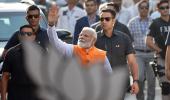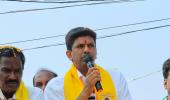While the responses of the candidates were predictable, depending on which side they belonged to, an interesting point slipped through when Rahul Shewale cited the Dharavi Redevelopment Project as a scheme that would add to Mumbai's importance.
No big infrastructural project in Mumbai, he said, could be successful without the Centre's nod.
Jyoti Punwani reports.

Can there be greater proof that what matters most in Mumbai is commerce? Finance and real estate dominated the debate between Mumbaikars and their Lok Sabha candidates held on Wednesday, May 8, 2024.
Redevelopment (of old buildings), transformation of slums into high rises, and the Dharavi redevelopment project were recurring themes voiced by the six candidates who turned up at the invitation of the Free Press Journal newspaper, the Praja Foundation and the Mumbai Press Club.
Three of the participants were from the INDIA alliance -- the Congress' Varsha Gaikwad, the Shiv Sena (UBT)'s Anil Desai and Arvind Sawant -- and three from the ruling Mahayuti: The BJP's Mihir Kotecha. the Shinde Sena's Rahul Shewale and Yamini Jadhav.
On a day when the prime minister attacked India's two biggest industrialists, Mukesh Ambani and Gautam Adani, the Adani-helmed Dharavi Revedelopment Project Private Ltd was fiercely attacked in Mumbai's old and stately landmark, the Indian Merchants Chamber, for being non-transparent and geared towards benefiting Adani, not the residents of India's largest slum.
The sharpest attack came from the Congress' Varsha Gaikwad, the MLA from Dharavi. Having won the assembly seat four times, she had been keen on fighting from there as MP, but had to settle for the Mumbai North Central constituency, because Uddhav Thackeray wanted the Dharavi seat for his party. His candidate, sitting Rajya Sabha MP Anil Desai, was also critical of the project, but he spoke in measured tones.
The preoccupation with real estate surfaced with the very first candidate to take the floor. The BJP's Mihir Kotecha, the sitting MLA from Mulund and its candidate from Mumbai North East, spoke of his vision of a "slum-free Mumbai". As per the 2011 census, 42% of Mumbai lives in slums.
Asked by a journalist to spell out what that meant for the slum-dwellers whose labour sustains Mumbai, Kotecha spoke of "in setu development" in the form of SRA (Slum Rehabilitation Authority) buildings, which would, he claimed, uplift the lives of the slum-dwellers.
The word "redevelopment" ran like a refrain through Rahul Shewale's vision for his constituency, Mumbai South Central, which includes Dharavi. Defending the Dharavi project, the Shinde Sena candidate and sitting MP said he was born in Dharavi, and had been involved in designing the redevelopment project.
***

The second theme that dominated the debate was Mumbai's status as the financial capital of the country. Was this status falling because of the shifting of key projects to Gujarat, including the International Finances Services Centre? While Mumbai paid the most amount of taxes, what did it get in return?
While the responses of the candidates were predictable, depending on which side they belonged to, an interesting point slipped through when Rahul Shewale cited the Dharavi Redevelopment Project as a scheme that would add to Mumbai's importance. No big infrastructural project in Mumbai, he said, could be successful without the Centre's nod.
Shewale cited two examples to substantiate his point. Had the Railways not agreed to give up their land for the Dharavi project, it could not have taken off.
Similarly, had he not persuaded the environment ministry to agree to grant, in one go, environmental clearances for all the buildings proposed to be built in Dharavi, the project would have taken years.
The flip side of this was shown up by INDIA alliance candidate Arvind Sawant, the sitting MP from Mumbai South, belonging to Uddhav Thackeray's Sena. The Centre had refused to let the Metro Car Shed be located in the suburb of Kanjurmarg, he pointed out, when Uddhav Thackeray was the chief minister. But now, with the BJP in power, the Centre had agreed to grant that very land for the car shed.
Sawant also punctured Kotecha's grandiose talk about high rises improving the lives of Mumbai's slum dwellers, alleging that the towers were built so close together that those living below the 10th floor got no sunlight.
***

Mumbai boasts of the wealthiest municipal corporation in Asia. Corruption in the BMC, and the delay in holding elections to it (and to all municipal bodies in Maharashtra) also featured in the debate.
Well-known RTI and anti-corruption activist Kamlakar Shenoy lashed out at the various lapses of the BMC: Its "Mumbai beautification" scheme, which he described as an exercise in illegality and corruption; granting permission for high rises without bothering about providing essential civic amenities such as schools and hospitals in the vicinity; indulgence towards builders who left residents in the lurch...
"Isn't it the duty of elected representatives to look at all this?" he asked Rahul Shewale and Yamini Jadhav. Shewale had been chairman of the BMC's all-important standing committee four times; Jadhav's husband Yashwant was chairman till the BMC ended its term in 2022. Jadhav herself is a three-time corporator, and now a sitting MLA.
There was not much the two could say in defence. Shewale protested that he himself had never been involved in any of these corrupt activities; Yamini Jadhav took Shenoy's allegations as "suggestions" which she would consider.
Stung by a remark from a citizen that "nobody who gets elected does any work", she declared that she continued to work despite having had cancer surgery. "I'm not a cancer survivor but a cancer warrior," she said.
***

But apart from land and money, the two driving forces of Mumbai, the debate also threw up questions on Maharashtra's new politics: The split in parties. Both the Shiv Sena and the NCP had seen sections break away under the leadership of Eknath Shinde and Ajit Pawar respectively, to join the BJP-led NDA. Shinde is now Maharashtra's chief minister and Pawar the deputy CM.
Yamini Jadhav made a vain effort to defend herself and those who had left the Sena along with her in June 2022. Though nobody had used the word 'gaddar' (traitor), she herself asked the audience to define it. "I didn't leave the Sena; I am in the real Sena that follows Balasaheb Thackeray's ideology," she said.
As part of the undivided Shiv Sena, Jadhav was being investigated along with her husband by the Income Tax department as well as the Enforcement Directorate. After the couple joined the Shinde Sena however, those investigations went cold. Jadhav refused to talk about this topic, saying it was sub-judice.
The second twist in Maharashtra politics that has confounded many, is the Uddhav Thackeray-led Shiv Sena's new closeness to the minority it had always demonised: Muslims. Anil Desai made embarrassed attempts to explain his party's new stand. Sena chief Bal Thackeray's Hindutva was actually "nationalism", said Desai.
Asked about the 1992-1993 riots in which the Sena had been found by a judicial commission to have played a major role, Desai claimed that Bal Thackeray was also the one who ended the riots.
Fears that if the Sena returned to power, its animosity towards "outsiders", and its emphasis on "Marathi asmita" would dominate policy in Mumbai were also raised. Kotecha blamed the INDIA alliance for bringing in the old "Gujarati-Marathi" divide.
Sawant tried hard to dispel these fears. "Vikas can't be done alone; every community has developed Mumbai," he said. Urging the audience to try and understand the concept of "Marathi asmita", he said Uddhav Thackeray's slogan of 'Mi Mumbaikar', which included all communities living in the city, best summarised the Sena's approach.
***

The debate showed that in one respect, the Sena had not changed.
Arvind Sawant was asked by a youth whether, if the INDIA alliance came to power, it would be as intolerant of dissent as the BJP. "Will you allow criticism of Bal Thackeray?" "No I will not," retorted Sawant. "Say 'Balasaheb Thackeray'. Dissent should be decent. This refusal to say 'Balasaheb' shows your lack of culture and arrogance."
Maharashtra has also seen the strange alliance between historically sworn enemies, the Congress and the Shiv Sena. Asked to explain their new relationship, Varsha Gaikwad said that while it was true that she had always opposed the Shiv Sena, she had been pleasantly surprised to find that as CM, Uddhav Thackeray had given her full freedom both as education minister, and during the COVID-19 pandemic, when Dharavi was particularly affected and saw the first Covid death.
When Gaikwad was given the ticket from Mumbai North Central, Uddhav, whose residence falls in her constituency, had told the press that for the first time he would be voting Congress. "I had already created history as the first woman president of the Mumbai Congress. Now I'll create history as the first Congress candidate to get a vote from a Thackeray," said Gaikwad.
***

In the visions articulated by the Congress' Varsha Gaikwad and the BJP's Mihir Kotecha, one saw the two extremes that characterise Mumbai.
Kotecha, fighting from a constituency he has always lived in, spoke of providing cable cars and a world class aviary to boost tourism for the city's residents. Gaikwad, fighting from a constituency where she is a newcomer, listed the threat of eviction faced by employees of Air India as the Tatas and Adani moved in to take over their colony for airport expansion.
Speaking of the vast Muslim-dominated slum settlement of Mankhurd in his constituency, Kotecha condemned it as a "drug den full of criminals". Gaikwad, speaking of the fishermen's colony of Khar Danda, promised to provide water to its residents. It was a shame that in an area considered posh, Mumbai's original inhabitants still lacked water, she said.
Feature Presentation: Aslam Hunani/Rediff.com











 © 2025
© 2025